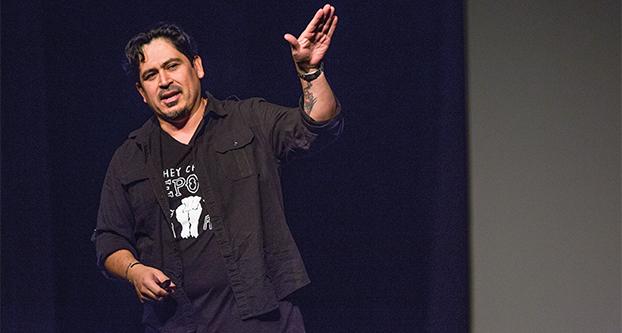American Book Award-winning author Tim Z. Hernandez drew an audience of over 100 people to officially launch his novel “All They Will Call You” at Fresno State’s Satellite Student Union on Jan. 27.
The novel takes readers on an adventure through Hernandez’s research of locating the unnamed victims of the Jan. 28, 1948 Los Gatos Canyon plane crash in western Fresno County.
Hernandez’s journey began in 2010. He made it a personal goal to identify and share the stories of the passengers whose names had been overlooked by media at the time.
Assistant professor of history Romeo Guzman prefaced the event by pointing out its relevance to the national rhetoric surrounding Mexican immigrants.
Guzman said he hopes the cumulation of artists and historians will counter the rhetoric by utilizing a “fact-based narrative.”
Joseph Rios, a Fresno native and poet, took the stage to introduce Hernandez. He recalled the first time he met Hernandez and their journey together.
Before Hernandez took the audience on a visual experience of his research, he invited his three children, Quetzani, 22, Rumi, 12 and Salvador, 8, onto the stage.
“There are people out there who need to hear these stories,” he said to his children as they looked out into the audience.
Hernandez asked the audience to picture themselves in 1948 being asked to transport 28 Mexican nationals from Oakland to the San Diego border of Mexico, El Centro.
Hernandez did not have a lot of information to begin working with. He said all he had was a headline of “Thirty-two die in farm labor accident.”
Hernandez said the names, ages and hometowns of the two pilots, stewardess and the immigration guard were included, but the 28 passengers were grouped as “28 Mexican deportees.”
The crew that was identified by media in 1948 included: Frank Atkinson, pilot; Marion Ewing, co-pilot; Frank Chaffin, immigration guard; Bobbie Atkinson, stewardess.
Shortly after the plane crash, singer-songwriter, Woody Guthrie, wrote the poem “Deportee” to commemorate the unnamed victims in the wreck. He gave them symbolic names such as Juan, Rosalita and MarÃa.
To accompany Hernandez’s stories of the families, he invited various people from his archival journey to help the audience visualize the lives and culture that belonged to the passengers.
In 1958, a decade after “Deportee” was written by Guthrie, Martin Hoffman put the iconic poem to a melody. Singer-songwriter Joel Rafael, performed Guthrie’s “Deportee.” Rafael’s career has largely concentrated on Guthrie’s work as he released an entire album covering Guthrie’s songs, entitled “Woodyboye,” in 2005.
Hernandez came in contact with various musical artists through his research and one in particular has been a major influence: Pete Seeger.
Shortly after Hoffman added a melody to Guthrie’s poem, Seeger began including Guthrie’s “Deportee” poem-turned-song at his concerts, and the song quickly became popular.
Hernandez shared a story with the audience about when Seeger contacted him personally.
“Here I am one day at the Brooklyn Book Festival [in 2013] and I’m walking in Manhattan going to the festival, and I get a phone call. I didn’t recognize the phone call, so I kept walking,” Hernandez said.
He revealed that the screened call was Seeger. Moments later, he had a voicemail from Seeger that he played to the audience. Seeger said, “This is Pete Seeger … I got your beautiful letter and I need to talk to you.”
In between performances, Hernandez shared stories that he uncovered through his research of the passengers and their families.
The next performance was from Raoul Hernandez, a mariachero who performed the song “México Lindo y Querido” originally performed by Mexican composer Chucho Monge. Crowd members warmly received the performance as they sang along with smiles on their faces.
The next performance of “Deportees” was by John Boomer, who was one of the producers of the song with Hoffman.
The evening’s last performance was by Lance Canales, a local musician, who sang “Deportees” while the audience and Hernandez recited the recovered names of the passengers one-by-one.
The audience and Hernandez said in Spanish “presente” after each name was called.
In 2013, the passengers were buried in a mass grave at the Holy Cross Cemetery in Fresno. A majority of the names were missing until Hernandez installed a monument at the cemetery identifying all 28 passengers.
Veronica Aguirre, a Fresno State alum, said she attended the event because she took interest in the stories that were being presented on.
“It’s Valley — I’m Valley born and I want to know more about the people who came before me,” Aguirre said.
Aguirre’s husband, Pedro Aguirre, also a Fresno State Alumni, said he felt the need to come to the event to explore deeper into the topic of immigration.
“It’s something our parents grew up with and you kind of just get comfortable,” Aguirre said. “Especially now with things in politics that have drastically changed, it’s good to get a refresher to expose yourself to how it used to be. If you don’t learn from history, it tends to repeat itself.”
Before Hernandez concluded, he asked his family, as well as everyone who helped his research, to stand up and be honored. Once everyone took the stage, a brief Q&A took place.
Before and after the event, the audience was able to view historic photographs and documents found during Hernandez’s research.
Hernandez is a finalist for the Freedom Plow Award for innovation for the novel’s literature and activism.
At the end of the event, the audience had the chance to purchase the novel and have it signed by Hernandez.
The event was co-sponsored by The Valley Public History Initiative with additional support by the College of Arts and Humanities, the Latin American Studies Department and the university’s new Fresno State Valley Public History Initiative: Preserving our Stories program.



